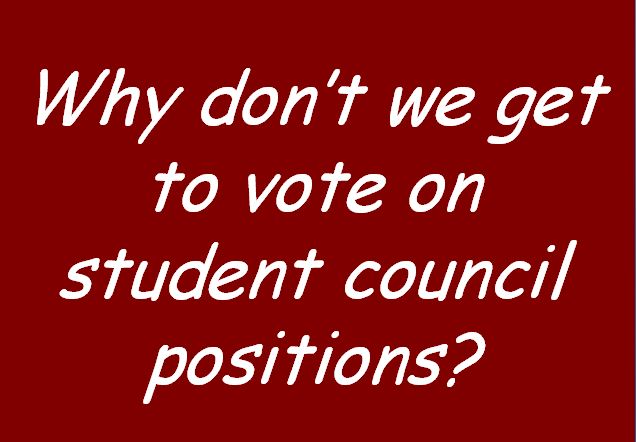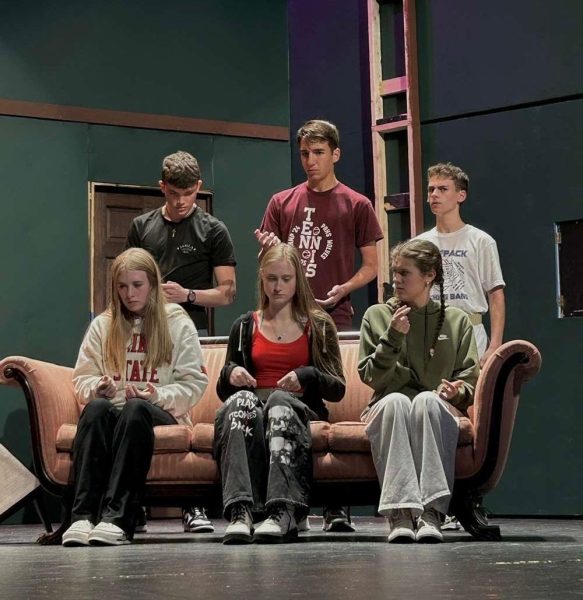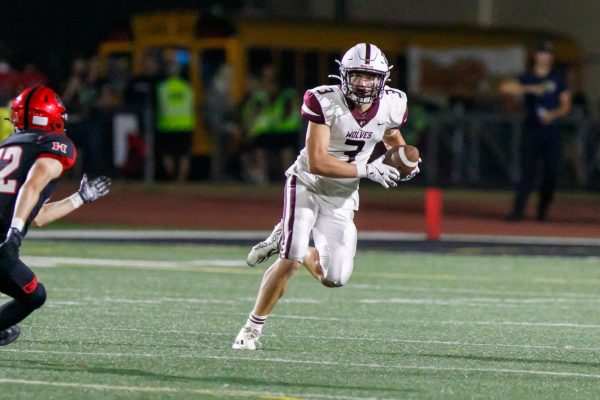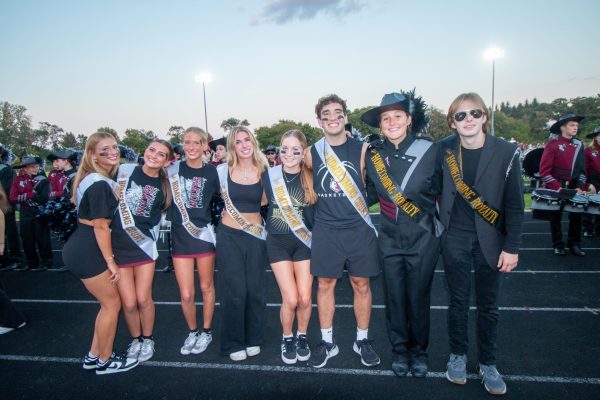The Role of Student Council at Prairie Ridge
The news team received several questions on the role of student voice at PR.
For the Wolf Prints Ask the Principal series, multiple questions were submitted pertaining to student government and student voice at Prairie Ridge. For interview purposes, Wolf Prints rephrased some questions and added questions to get more complete answers. The following are the questions that Wolf Prints received:
- Why has the school received a democracy award if none of the students can vote? Also, why is student council made up of non-elected students? Why can we not vote for those who represent us?
- If Democracy is a verb, how come we can’t have a say in anything?
- What is democracy? Is that when faculty dominates everything and everything is monitored the whole day? Or is that hypocrisy?
- Why is student council appointed by the administration and not elected by the students?
- Why can’t the student body decide the student council “executive board”?
The Wolf Prints news team discussed these questions about student voice and decided to interview three different people: Dr. Koch, Prairie Ridge principal, Mr. Karlblom, student council sponsor, and Karsen Gilmore, a two-year member of student council. What follows is a transcript of the interviews.
What is democracy?
Dr. Koch: Democracy I think is, in short, citizens being active participants.
Mr. Karlblom: Where people have a say in their own lives and in their own choices, and they can vote and have their vote count and be allowed to make decisions based on their personal beliefs and values and interests and goals.
How do you think that’s related to PR? How can PR students be active in their democratic school?
Dr. Koch: We want students here to be aware of what they’re doing as they go through school, we want them to have goals as they go through school and after school that kind of inform everything from what courses they take, to what activities they join. That’s part of being active, they’re not just kind of going through the motions. We want students at PR to have a voice to speak up to help us rewrite rules or policy, or decide how we celebrate things, recognize things, how we operate.
What are some ways you would suggest that students should express their voice in ways that will be beneficial to how the school is run?
Dr. Koch: We have student leadership groups that are open to anybody. Anyone can join student council, anyone can come to my student advisory group, that’s a two year old group now, kind of new, students can reach out to me via social media or directly to voice their concerns. I know students have brought concerns to counselors and such, student services, any of those channels work really well.
Why do you think students feel cynical the way student voice has been portrayed at PR?
Dr. Koch: I don’t know, because it’s easy to be cynical? We really do have a school that invites students to participate and I think that there are other schools out there where you don’t find that. I don’t think that we are a very rigid school. That said, all schools have rules. Democracy does not mean anarchy. There can’t just be a free-for-all, we wouldn’t be able to function, much less function at a high level. So we look for within, to the extent possible, and what’s reasonable, to give kids a voice.
Why is student council appointed by the administration and not elected by the students?
Dr. Koch: It’s neither of those two things. We don’t appoint anybody to any group. My understanding, and you can talk to Mrs. Kendall or Mr. Karlblom about student council, that any student can apply and become a part of student council. There’s no appointment of any kind, so if that’s a rumor out there, that’s false.
After asking Dr. Koch these questions, Wolf Prints went to a student council advisor and member for more information about procedures.
How is student council run? What does the leadership within it look like?
Mr. Karlblom: Student council has two advisors, which would be myself and Mrs. Kendall. We have an executive board that has six members on it. We don’t really have president, vice president, secretary treasurer or assigned roles, we just have six girls, actually, who are on the executive board. And I took over student council with Mrs. Kendall at the semester, so I’m not exactly sure how they became the six people, but I think there was an application process and they were interviewed, and they were chosen based on their application and their interviews.
By who? Who chose them?
Mr. Karlblom: By the advisors.
How is the executive board selected for student council?
Karsen Gilmore: I think it’s if you want to apply to it, then they’ll pick a certain amount of people. But we might be changing it up this year where it’s voting for who you think is leader of student council, people who voice their opinion the most.
The news team thought it would also be important to ask leaders about the purpose of student council at PR.
So what does student council do? What’s their purpose?
Dr. Koch: They have a variety of things that they’re responsible for. Again, I would direct you to Mrs. Kendall or Mr. Karlblom for really good detail about what they do. But they’re involved in designing some of our large events and leading some of our large events from dances to pep assemblies, homecomings, they weigh in on some of the decisions and programs that we do here in the building. They’re just generally a leadership group, and again, anyone can join that. They do have an executive board that I think from within student council you have to apply for that. But again, since anyone can be on student council, then anyone can really be on that board too.
Mr. Karlblom: The role of student council is to promote school spirit, and organize activities for the students, primarily homecoming. And we do the PRAC, which is the Prairie Ridge Awards Ceremony. We [did] the honors assembly before break, and we do some other charitable events throughout the year, and some fundraising activities.
Karsen Gilmore: To get the student body to participate in school events, and to organize school events for the student body to get involved.
Why has the school received a democracy award if none of the students can vote? Also, why is student council made up of non-elected students? Why can we not vote for those who represent us?
Mr. Karlblom: I think if one of the questions was, if this is a democracy school why don’t the students get to vote on who’s on, say, student council, like who’s on student council or who’s on the executive board, it’s because the main reason is we don’t want some of the leadership positions to be popularity contests, and oftentimes with, you know, high school students voting it can turn into more popularity contests and friends and friends and friends and who’s the best at maybe social media marketing and advertising as opposed to who has the skills and abilities to do the job well, so that’s why we have chosen to go the application and interview route as opposed to the voting route because we want to make sure we’re confident in the skills and abilities of the candidates as opposed to who’s the best at generating votes.
At PR, there are many outlets for students to voice their opinion. Whether that be Lyceum, student council, or Wolf Prints, students can find ways to actively be a part of our school. The news team invites readers to use the comment section here beneath all Wolf Print articles for people to add ideas, questions or opinions.






PR Underground News • May 11, 2016 at 5:17 pm
For updates on controversial administration decisions and the movement for student democracy, visit @PRHSUnderground on Twitter. Our YouTube channel is PR Underground News.
“Can’t co-opt us, can’t stop us. Get the real story here.”
Samizdat • May 4, 2016 at 6:39 pm
I appreciate the opportunity to read and understand these positions, and I am glad my question was answered. However, democracy is at stake, and I must defend it.
Any democratic elections are ultimately a “popularity contest.” Despite this reality, we still have elections in the U.S., since this country is founded on a Constitution that values the rights of citizens and the need for a representative system instead of a monarchy or dictatorship. No one can control the reasons why each individual American votes. Someone may choose a candidate because his/her positions are more solid, while someone else may choose a candidate based on the way he/she speaks. But democracy offers accountability, because the people ultimately get what they asked for.
Of course, it would be much easier for the elites in society to appoint those who have what are deemed “the skills and abilities to do the job well.” But there are reasons for democratic processes- this hits right at the core of the values of free societies. When democracy does not exist, who determines who becomes the leaders? Certainly not the people. We the people play no part in deciding, anonymously and fairly, who should represent us, when we cannot elect our leaders. If anything, vying for positions under an oppressive regime is a popularity contest. It becomes a matter of who has the most connections or who will carry out the will of authority figures with the least resistance. Then, when unpopular decisions are made, the leaders and the entire system lack any accountability to the people since the people have no power to begin with.
With this background, and with the knowledge that voting is the linchpin of a democratic society, the appointment instead of election of the Prairie Ridge Student Council Executive Board is a situation that makes students like myself feel powerless, despite the “many outlets” for expression of our viewpoints. Students can always take advantage of these extracurricular opportunities, but that is not the point, and the methods of creating an Executive Board are only part of the issue. The main, overarching problem is that Prairie Ride High School has no elected student government that considers and acts on real issues facing students. Lyceum can offer a forum for political debate, Wolf Prints can give students a valuable way to express their viewpoints in writing, and Student Council and many other clubs can plan events for the school and “promote school spirit,” but this does not entail a solid, meaningful, and representative liaison between the administration and the students. Without this liaison, students may rightfully distrust that the administration actually values our input.
Countless decisions have been made over the past couple years with little or no opportunities for widespread student feedback- the prom dress code, the no “twerking” policy, the revival of the hats policy, an increase in intensity of P.E. classes, more emphasis on AP classes/tests, an increase in school security, the use of eerily Orwellian social media slogans, the elimination of the snack bar (yes, underclassmen, we used to have one!), and more. These decisions, if made by the administration or district BUT viewed, debated, and voted on by members of an elected student government, would have had far more legitimacy in the eyes of the students. An elected student government at least gives students the comfort that our views can be part of the process on decisions that impact our daily lives.
Elected student government, like the U.S. Congress, or the British Parliament, or the French National Assembly, or any democratic body, does not mean all problems will disappear and everyone will be happy. As Winston Churchill famously quoted, “Democracy is the worst form of Government except for all those other forms that have been tried from time to time.” However, a democratic government would finally alleviate students’ fears that their voices have no weight at PR. The students of PR are actually quite smart (thanks to all those AP classes, I guess) and capable of making rational human decisions. Besides, 18-year-old high school students actually can vote, and in a very important series of elections: the state and national ones. Learning how to consider positions, weigh candidates, and maybe even campaign are skills that may really help students when it comes time to fill out the ballot.
If the grand experiment of student democracy falls short of expectations or fails all together, then it can always be revised. Then at least we attempted to live up to the slogan “Democracy is a Verb.”
Thank you.
Stu Dent • May 3, 2016 at 6:07 pm
Students can’t vote. Students must interview for positions. Students are chosen by advisors. Sounds like administration appointments to me!
#OpenYourEyesPR